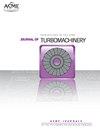Characterizing Shrouded Stator Cavity Flow on the Performance of a Single-Stage Axial Transonic Compressor
IF 3.1
3区 工程技术
Q3 ENGINEERING, MECHANICAL
引用次数: 0
Abstract
Shrouded stator cavity flow increases the stator total pressure loss, reduces the compressor isentropic efficiency and thus limits the compressor pressure rise capability. This paper proposes a simplified cavity flow model that consists of flow injection at the stator inlet and flow suction at the stator outlet. Based on this model, a full-factorial parametric study on the leakage flow ratio and the leakage swirl angle is performed at different rotational speeds and incidences. In the first place, the effectiveness of the numerical method is validated against the experimental data based on the full-scale cavity geometry; then, the numerical simulations on the simplified cavity geometry are validated against that of the full-scale one. Results show that the leakage flow ratio plays a dominant role in determining the compressor performance penalty. The isentropic efficiency drops almost linearly with the leakage flow ratio due to deteriorated near-hub separations, and the slope becomes steeper at higher operating speeds and incidences. The leakage swirl angle only has a pronounced effect under a high leakage flow ratio. The efficiency penalty reduces with increasing swirl angle due to an alleviated tangential flow mixing and suppressed near-hub separations. The swirl angle effect is more pronounced at lower incidence conditions. These findings advance the fundamental understanding of shrouded stator cavity flow effects and provide useful guidance for cavity seal designs.带罩定子腔流对单级轴流跨音速压缩机性能的影响
带护罩的定子腔流增加了定子总压损失,降低了压缩机的等熵效率,从而限制了压缩机的升压能力。本文提出了一个简化的空腔流动模型,该模型由定子入口的流动注射和定子出口的流动吸力组成。基于该模型,对不同转速和冲角下的泄漏流量比和泄漏涡流角进行了全因子参数研究。首先,根据全尺寸腔几何的实验数据验证了数值方法的有效性;然后,将简化后的空腔几何形状的数值模拟与全尺寸空腔的数值模拟进行了对比验证。结果表明,泄漏流量比在决定压缩机性能损失方面起着主导作用。由于近轮毂分离的恶化,等熵效率几乎随着泄漏流量比线性下降,并且在更高的运行速度和入射角下斜率变得更陡。泄漏涡流角仅在高泄漏流量比下具有显著影响。由于减少了切向流混合并抑制了近轮毂分离,效率损失随着涡流角的增加而减少。涡流角效应在较低入射角条件下更为明显。这些发现促进了对带罩定子腔流动效应的基本理解,并为腔密封设计提供了有用的指导。
本文章由计算机程序翻译,如有差异,请以英文原文为准。
求助全文
约1分钟内获得全文
求助全文
来源期刊
CiteScore
4.70
自引率
11.80%
发文量
168
审稿时长
9 months
期刊介绍:
The Journal of Turbomachinery publishes archival-quality, peer-reviewed technical papers that advance the state-of-the-art of turbomachinery technology related to gas turbine engines. The broad scope of the subject matter includes the fluid dynamics, heat transfer, and aeromechanics technology associated with the design, analysis, modeling, testing, and performance of turbomachinery. Emphasis is placed on gas-path technologies associated with axial compressors, centrifugal compressors, and turbines.
Topics: Aerodynamic design, analysis, and test of compressor and turbine blading; Compressor stall, surge, and operability issues; Heat transfer phenomena and film cooling design, analysis, and testing in turbines; Aeromechanical instabilities; Computational fluid dynamics (CFD) applied to turbomachinery, boundary layer development, measurement techniques, and cavity and leaking flows.

 求助内容:
求助内容: 应助结果提醒方式:
应助结果提醒方式:


